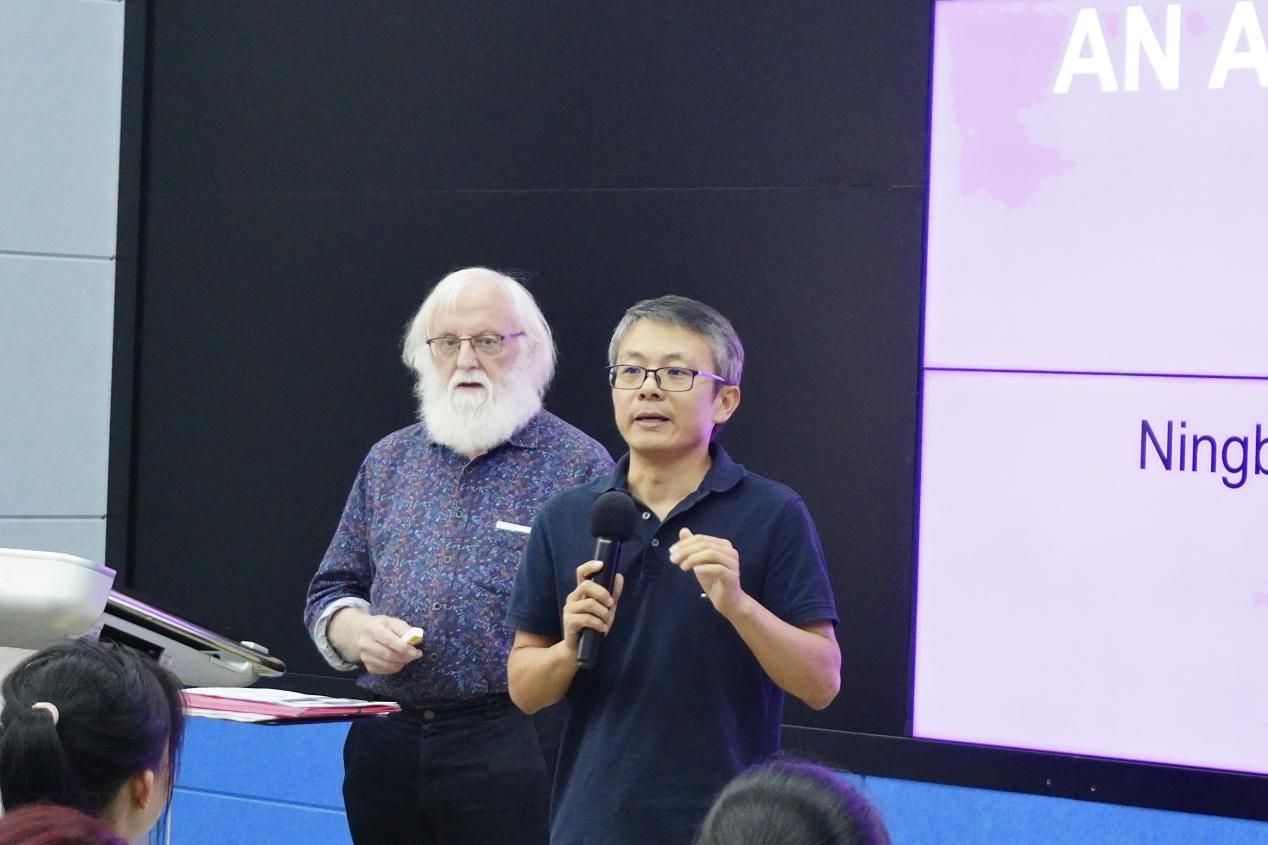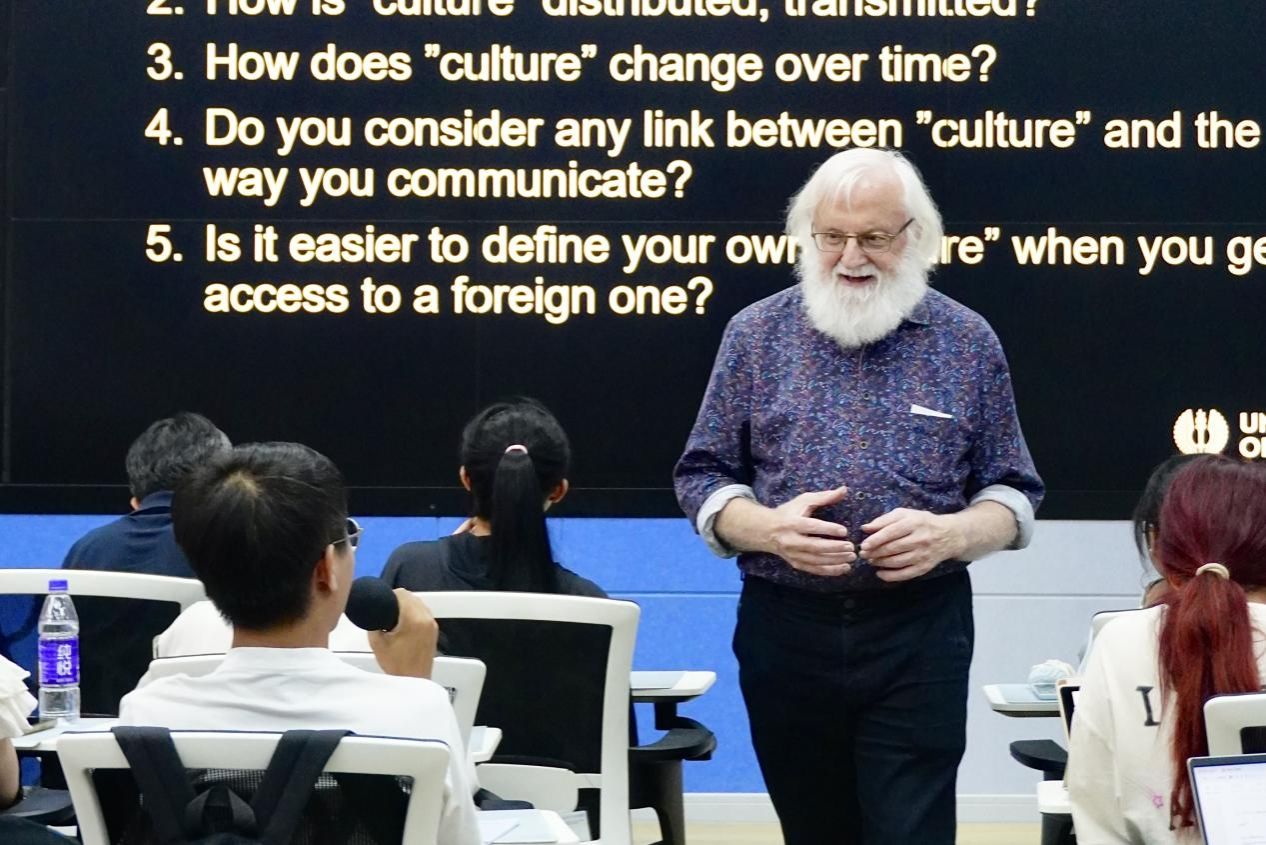
By: Lin Wanxin, Hu Lan, Wang Yili, Liu Xueming Photo: Li Chenxi, Wu Jiahui, Fu Yufei, Chen Keyan Review: He Ying
Ningbo, China – A landmark lecture series by Professor Yves Gambier at Ningbo University (October 13-17, 2025) explored cutting-edge topics from translation "reception" and "multimodality" to the pathways for international publication, equipping students and faculty with forward-looking perspectives on the evolving discipline.
Professor Yves Gambier, an emeritus professor from the University of Turku, Finland, is one of the most influential figures in contemporary Translation Studies. With a prolific academic career spanning decades, he has authored over 200 publications and pioneered research across critical areas including audiovisual translation, socio-terminology, bilingual education, and discourse analysis. His extensive editorial leadership encompasses roles as General Editor of the Benjamins Translation Library, co-editor of the online Handbook of Translation Studies and Translation Studies Bibliography, and editorial board membership for several top-tier journals such as Target and Terminology. A former President of the European Society for Translation Studies (EST), Professor Gambier has also led multiple EU and Nordic research projects, significantly shaping both the academic and practical landscapes of the field globally.
Laying the Groundwork: Research "Scientificity" and Translation "Reception"
During the inaugural lecture, "Research Methods: Basic Questions," chaired by Professor He Ying on October 13, Professor Gambier dove deep into the scientific rigor of research and the vital importance of standardizing academic writing. Drawing on decades of rich scholarly experience, he systematically elucidated the four indispensable pillars of scientific research: systematicity, logicality, collectivity, and integrity. He particularly emphasized that unwavering adherence to academic ethics compels scholars to faithfully report data, even when it defies perfect interpretation. Furthermore, he meticulously unpacked key issues such as defining core concepts, navigating practical research constraints, embracing methodological diversity, and acknowledging the indispensable role of researcher reflexivity, offering comprehensive, practical guidance spanning methodological design to thesis composition.

Building on this foundation, Professor Gambier's October 14 lecture, chaired by Professor Zhang Zhi, centered on the pivotal concept of "reception." He defined it as the dynamic process through which a translated text's meaning is actively shaped by the intricate interplay between readers and society. He illuminated that translators are not the sole arbiters of meaning; instead, textual meaning emerges dynamically through the continuous interaction between readers and the text itself. By deftly deconstructing the sociological lens of "social effect" alongside the cognitive-textual perspectives of "immediate reaction" and "interpretive response," he established a robust, three-dimensional framework for reception studies in translation.

Focusing on the Forefront: "Multimodality" and the Concept of "Culture"
Amid sweeping technological evolution and accelerating globalization, the very concept of "culture" is undergoing profound transformation. The afternoon lecture on October 16th, titled "Culture Today: An Ambiguous Concept," was chaired by Professor Fu Rongbo. Professor Gambier led participants in deep scholarly contemplation, dissecting how "culture" has evolved from a traditional, top-down symbol of national identity into a dynamic, diverse, and inherently ambiguous complex. He urged faculty and students to embrace an interdisciplinary lens, focusing sharply on how language transfer actively shapes cultural dissemination pathways. By prompting reflection on "how culture is defined, reformulated, and reproduced," he unlocked crucial insights for contemporary translation practice. The audience engaged in vibrant discussions exploring identity anxiety within cultural globalization, translation's pivotal function in cultural mediation, and the impact of contextual differences on discourse expression.

In his lecture "Translation, Audiovisual Translation, and Multimodality Studies," Professor Gambier asserted: "Within the digital communication ecosystem, multimodality has become the standard, not the exception." Utilizing paradigmatic cases like subtitling and game localization, he systematically delineated translation studies' paradigm shift—from "equivalence" to "culture," and from "printed books" to "digital media." He meticulously detailed diverse translation pathways, including intramodal and intermedial translation. Professor Gambier underscored that the ascent of multimodal translation is significantly raising the professional bar. He outlined how future practitioners must master an integrated blend of semiotic, cross-cultural, and technical competencies, thereby charting an innovative course for the Faculty's MTI education.
Looking Ahead: Disciplinary Directions and Academic Publishing
The final two lectures of the series were presided over by Professor Lei Jun and Dr. Wang Yili respectively, drawing a vibrant assembly of over 80 participants, including faculty and doctoral students from across the university.
In his lecture "The Future of Translation," Professor Gambier delivered an incisive analysis of the concept's evolution and expansion. He contended that the traditional theory of "equivalence" no longer adequately encompasses contemporary, multifaceted practices, while the rise of non-professional translators further underscores the chasm between academic research and reality. Confronting the relentless tide of technology, he advocated preserving a critical perspective while actively exploring innovative models of human-machine collaboration. He underscored a vital truth: "Technological tools evolve at breakneck speed, yet the fundamental human need for cross-cultural communication remains immutable."

Shifting focus to "Pathways to International Publication," Professor Gambier methodically unpacked core publishing strategies, leveraging his extensive experience as editor-in-chief, editorial board member, and reviewer for premier international journals. From an editor's vantage point, he pinpointed innovation, rigorous argumentation, and standardized writing as the three paramount elements prized by international publications. He outlined actionable advice for young scholars: target reputable journals employing double-blind peer review and vigilantly avoid predatory ones; articulate research originality with precision and candidly acknowledge limitations within manuscripts. He particularly encouraged attendees to normalize manuscript rejections, transforming them into catalysts for deeper inquiry and diligently incorporating reviewer feedback for continuous refinement.
During the ensuing "Young Scholars Development Forum," new faculty members Dr. Yu Weicheng, Dr. Li Jing, and Dr. Chen Gaoya presented their research projects. Professor Gambier provided insightful commentary on topics such as Chinese literature translation abroad and national image building, offering detailed guidance on precisely defining core concepts, pioneering fresh research perspectives, and developing outputs with strong international publication potential.
Distinguished Scholar Profile
Since the 1970s, Professor Yves Gambier has been deeply immersed in translation studies, authoring and editing over 200 influential scholarly works that span critical areas like audiovisual translation, terminology, and bilingual education. His extensive contributions have fundamentally reshaped the discipline's knowledge system. Serving on the editorial boards of prestigious international journals such as Babel, Target, and Terminology, he also held the pivotal role of General Editor for the Benjamins Translation Library for many years, tirelessly championing the publication of exceptional academic scholarship. As Co-Editor of the online Handbook of Translation Studies and Translation Studies Bibliography, he masterminded indispensable core resource platforms for translation scholars across the globe. Within academic organizations, Professor Gambier's leadership shone brightly; he served as President of the European Society for Translation Studies (EST), spearheaded major EU research initiatives, and has been vigorously advancing translation studies worldwide through his profound academic vision and influence.
In 2022, Foreign Language Teaching and Research Press proudly published Border Crossings: Translation Studies and Other Disciplines, co-authored by Professor Yves Gambier and Professor Luc van Doorslaer, within its esteemed "Contemporary Linguistics and Applied Linguistics Library" series. Professor Xin Hongjuan from the Faculty of Foreign Languages at NBU contributed the insightful Chinese introduction to this significant work.
Conclusion
The lecture series by Professor Gambier provided a comprehensive and intellectually engaging platform for faculty and students at Ningbo University. Through six thematically connected sessions—ranging from foundational methodological training to advanced topics such as reception theory and multimodal translation—the event catered to a diverse academic audience, from undergraduates exploring the discipline to young scholars refining their research and publication strategies.
Participants particularly valued the dynamic Q&A sessions, where Professor Gambier’s expertise and clarity fostered thoughtful dialogue. By facilitating this direct exchange with an internationally recognized leader in the field, the event not only expanded local academic perspectives but also strengthened the Faculty’s engagement with global scholarly standards and practices. It marks a meaningful step forward in Ningbo University’s ongoing efforts to advance translation studies and cultivate a new generation of linguistically and interculturally competent professionals.
【Close】



